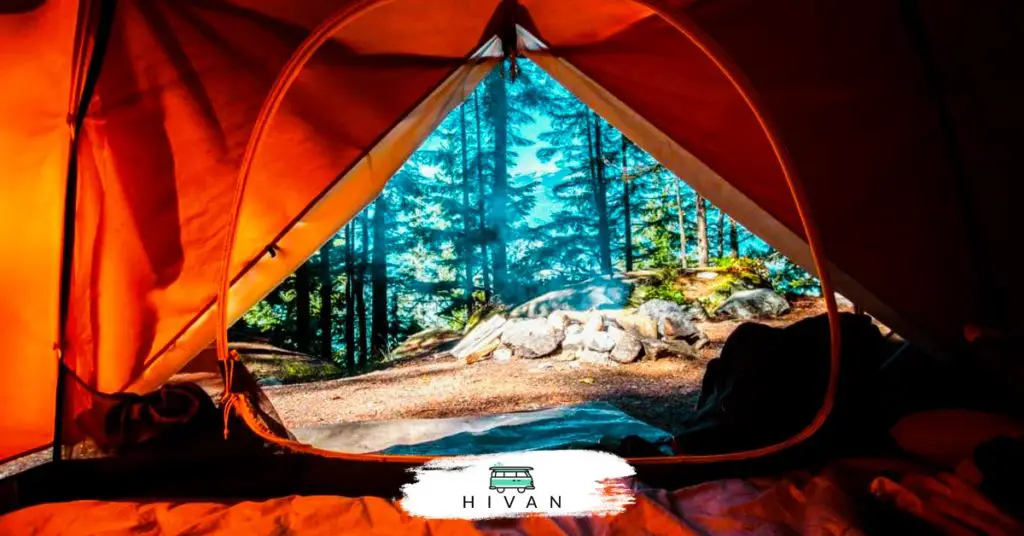Hi-van is supported by its audience. When you purchase using our links, we may earn an affiliate commission (no added cost to you). Learn more
Going camping can be an unforgettable adventure filled with new sights, sounds, and experiences. But for some, camping is a tedious activity that yields few positives. Why is camping so boring for some people?

Camping is boring for some people due to personal preferences. Individuals that don’t enjoy spending time outdoors, exercising, or being without modern conveniences may despise camping. However, not all camping is primitive, as many luxurious camping sites and activities may appeal to non-campers.
This article will explore the reasons why some folks might find camping boring, as well as a few potential ways to make your next camping trip more exciting and appealing. With this information, you can ensure that everyone has a great time on your next camping trip.
Why Do People Go Camping?
Before we can figure out why camping is so dull for some people, it’s crucial to consider the reasons why people decide to go camping in the first place. After all, there are plenty of people that thoroughly enjoy camping.
Some of the primary reasons why people decide to go camping include:
- Seeing natural wonders.
- Getting away from technology.
- Enjoy peace and quiet.
- Testing survival skills.
- Enjoy outdoor activities.
Ditching the 9-5 and spending some time out in nature can do wonders for a person’s mental and physical wellbeing. Sometimes called “forest bathing,” spending time in wooded areas has been linked to reduced feelings of depression and anxiety.
Additionally, going for a hike or enjoying physical outdoor activities often counts as aerobic exercise. This type of exercise gets your heart pumping and your blood flowing, potentially improving circulation and helping your muscles grow stronger.
If you live a hectic, fast-paced life, camping could be the ideal release from that stressful schedule. Most campsites are located in quiet, peaceful areas far from the hustle and bustle of urban cityscapes.
Of course, some folks enjoy camping as a means to test their survival skills. Learning how to live off of very little can boost a person’s self-confidence and help them appreciate the conveniences they enjoy back home.
Mastering basic survival skills while camping can also come in handy during an emergency, such as a flood or fire. Still, camping doesn’t appeal to everyone. Non-campers typically have a standard set of complaints when it comes to spending time in nature.
What Do People Dislike About Camping?
There are tons of positive aspects of camping, but there are also a few potential drawbacks. If you know someone who finds camping boring, you may be familiar with some of their reasons.
For example, many common reasons why a person might not like camping include:
- Inclement weather.
- Bug bites and wild animals.
- Uninteresting activities.
- Disconnection from society.
- Lackluster meals,
Getting caught in a massive thunderstorm while camping can be a buzzkill. Not only could you end up soaked from head to toe, but your tent can spring a leak. Another reason some folks don’t enjoy camping is the insects.
It’s common for campers to deal with a variety of insects, including:
- Wood ticks
- Mosquitoes
- Spiders
- Gnats
- Ants
- Wasps
Mites and fleas are also relatively commonplace throughout most of the North American wilderness. In addition to pesky insects, campers may also fear local wildlife, as bears, coyotes, and cougars can become life-threatening predators for unwary campers.
But, of course, biting bugs and wild animals aren’t the only reasons why some people don’t enjoy camping. There are also uninteresting activities to contend with. While hiking, kayaking, and tent-building might appeal to some, they’re not universally enjoyed.
For better or for worse, some folks would rather spend their weekend binge-watching a show than reconnecting with nature. Unfortunately, going camping can also mean losing your cell phone signal or experiencing WiFi interruptions, which can be bothersome or unacceptable for some campers.
Finally, there’s the issue of camp food. Because most campsites don’t feature refrigerators or modern cooking ranges, most campers dine on pre-packaged snacks or simple campfire meals. Those with picky palates might find this menu to be entirely unsuitable.
Different Types of Camping
It’s essential to note that there are quite a few types of camping. While most people might imagine a tent and campfire in the woods when they think about camping, this picturesque scene isn’t the only possibility.
Over the last several decades, campsites have diversified to meet the complex needs of modern campers.
As such, you can find the following:
- Primitive camping: It typically occurs somewhat randomly and involves choosing a site usually directly off a hiking trail, pitching a tent, and getting some rest. It’s the most rugged form of camping and often doesn’t feature access to toilets or electricity.
- On-site camping: It occurs on designated campsites, as most campsites that fall into this category are part of massive camping grounds. As such, campers that choose a reservable camping site almost always have access to running water, toilets, and electricity. Still, amenities vary.
- Van camping, or vehicle camping: It is often far more comfortable than primitive or on-site tent camping. Those that choose this option can sleep in their car, van, or RV instead of roughing it in a tent or hammock. Most van camping occurs on official campsites.
- Cabin camping: It involves sleeping in a cabin, usually with indoor plumbing, a kitchenette, beds, and appliances. Rentable cabins are commonplace throughout many national and state parks.
- Glamorous camping: Also called “glamping,” this option is often the best choice for those that find camping boring. That’s because glamping usually involves sleeping in comfortable beds, enjoying upgraded amenities, and gaining access to unique activities.
How To Make Camping Less Boring
Why is camping so boring for some people? It could be the type of accommodation, but it might also be the range of offered activities. After all, some people enjoy fishing and kayaking, but others might be more partial to ziplining or swimming.
To ensure you and your party have a fantastic camping trip, you’ll want to:
- Choose activities that everyone enjoys.
- Bring plenty of tasty snacks and meals.
- Choose an appropriate campsite.
- Select a gorgeous camping area.
- Ensure that everyone has a say.
Following these simple tips and tricks may be the ticket to changing some minds. Before you know it, the same person who said that camping is boring might be asking about the next trip out into the wild outdoors.
Conclusion
While there are many things to enjoy about camping, some potential drawbacks can make it challenging for some campers to have a great time. However, there are several different types of camping, each one catered to specific preferences and priorities.
Individuals that detest the idea of “roughing it” can enjoy glamping, cabin camping, or van camping without giving up too many modern conveniences. Choosing fun activities that your whole group enjoys is also a way to ensure your next camping trip is anything but boring.
Find this content useful 🙂 ?
Subscribe to our Newsletter and get a free Solar Electric Diagram + shopping list.

